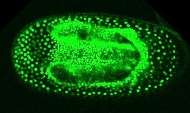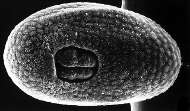Improved egg enabled insects to conquer the land

Insects are so successful on the land because insect eggs are protected from desiccation. Thanks to an extraembryonic membrane in the egg, the serosa, insects could successfully switch from life in the water to life on land. The research group of Veni laureate Dr Maurijn van der Zee (Leiden University) published about this research in Proceedings of the Royal Society B.
'The serosa is a membrane that the embryo produces. The serosa keeps water inside the egg,' explains first author and PhD student Chris Jacobs. 'First of all we have demonstrated that the serosa is unique to insect eggs. The ancestors of insects, shellfish such as crayfish and shrimps, do not have such a protective membrane. Those animals live in the sea whereas insects have made the switch to the land. To become genuinely independent of water, not only do the adults need to be protected against desiccation but the eggs also need to be able to develop on the land. The evolution of the serosa in insect eggs has made that possible.'

RNAi
The researchers used the flour beetle as a model to determine the function of the serosa. The fruit fly was not suitable because this is the only insect that has lost the serosa again. The flour beetle has a serosa just like all other insects. To knock out the serosa the researchers used the molecular genetic technique of RNA-interference to inhibit the gene expression. The serosa cannot be removed in any other manner as this membrane lies under the eggshell that the mother produces. RNAi made it possible to knock out the serosa whilst leaving the eggshell intact. After that the scientists saw that eggs without the serosa became sensitive to desiccation.
Vertebrates
'The entire story is similar to what happened with vertebrates,' adds research leader Maurijn van der Zee. 'Fish, the first vertebrates, lived in the water. Although amphibians have legs and lungs they still need to lay their eggs in the water and in that respect they are not genuine land animals. Only with the evolution of the amniotic egg, an egg with a membrane around it such as those laid by birds and reptiles, did vertebrates genuinely become independent of water. Similarly, in insects it is an innovation in the egg that has made them so successful on the land.'
More information: Paper: dx.doi.org/10.1098/rspb.2013.1082
Journal information: Proceedings of the Royal Society B


















